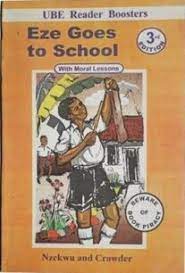Lasun Alagbe
As a former Managing Director and CEO of the Anambra Broadcasting Service, ABS, Dr Uche Nworah, celebrates his daughter, Lotanna, who is just starting secondary education in the has UK, he has brought to memory one of the evergreen school novels in Nigeria: Ege Goes to School.
Nworah’s primary idea is to express shock at having to spend a whooping £100 to get Lotanna’s hair braided.
He quickly converted the sum and it gave him N200,000!
Poor dad, but the money is gone while the beauty and joy the hairdo exude remain visible on lucky Lotanna.
Nworah then escaped into nostalgia as he recalled his first day in school in the village.
In the process, he saluted Eze Goes to School, which has never failed to fire the emotions of old folks who read and relished the novel.
Playing on the titled of the work, Nworah brilliantly wrote in a Wednesday post:
“AdaEzeudo Goes To School. My daughter Lotanna is starting secondary school today. She is posing here in her new hairstyle which she and Ugomba conspired to take £100 from me for,” he wrote.
“After paying for it, I went back and punched my calculator. In Peter Obi’s voice, I felt I had been robbed. Over N200K spent on a teen’s hair that will only last weeks. I made a mental note to sneak in when she is sleeping and shave her mala.
“I spoke to Lotanna about my first day in secondary school. My joy and excitement. I told her about Eze Goes To School which we read in Secondary Class One. It was an opportunity to make new friends and experience life as a teen. I prayed for her and wished her many success along the journey.
“I offered to take her to school but she bluntly refused. I remembered that rebel feeling. Big girl things.”
ABOUT EZE GOES TO SCHOOL
It centres on Eze Adi, the protagonist of the novel who struggles to get formal education due to his poor family background. Eze finally makes a name for himself due to his intelligence. The novel exhibits the struggles of getting formal education in Nigeria in the 90’s. These include truancy, cultism and poverty. Nzekwu and Crowder explain this albeit making it understandable for children.
The novel gathered positive reviews, with . Daily Trust listing it as one of the books every child must read. It is regarded as one of the evergreen books that tells the Nigerian story. It is also among literature texts that influenced kids in the 90’s by The Cable Lifestyle. Rudolf Ogoo Okonkwo writing for Sahara Reporters, also noted that it was among the “…elements of the forces acting everywhere East of the Niger today.”




